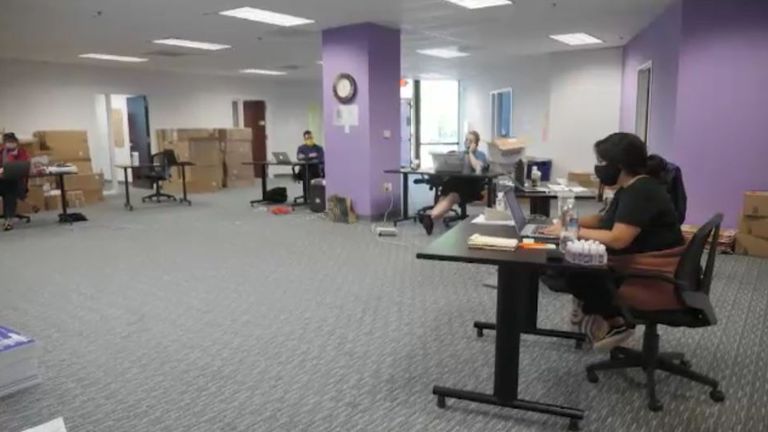They call it the boiler room.
It’s without its usual crammed intensity in these days of social distancing, but this very different US election keeps them busy.
At the headquarters of “Democracy North Carolina” in its state capital of Raleigh, 10 advisers bash phones and keyboards, providing support to the vote and to voters. The mission statement here is to “educate, mobilise and protect voters”.
Democracy N.C. operates a hotline that’s getting hotter in this election, shrouded as it is in claim and counter claim of voter suppression, intimidation and doubts across 50 states with 50 different sets of rules.
The state of North Carolina has a history of “suppression” disputes over access to the vote, some of which are reflected in other parts of the country.
Photo ID as a voting requirement is particularly contentious.
North Carolina’s courts have ruled that voters need to show a photo ID before casting a ballot, although the requirement has been set aside at this election pending legal challenges.
Opponents argue it is a measure designed to make voting more difficult for minorities and people of lower income, as they are less likely to possess a valid photo ID.
Tomas Lopez, executive director of Democracy N.C., told Sky News: “The kinds of ID that were going to be required of voters in North Carolina, specific photo ID, were less frequently held by black voters in particular.
“I think what we have seen, particularly over the last decade, are voting laws that are designed with politics in mind. North Carolina is not alone in this.”
With the ID issue postponed past this election, I asked Tomas to list his top five concerns regarding a fair and free voting process on 3 November.
These are his one to five:
1. Polling Place Intimidation:
“We may see groups that show up who aren’t necessarily organised but they may decide that they want to have their presence felt and that intimidates other voters. I think rhetoric like what we’re hearing from the president does not help, but I think the broader atmosphere around voting is bigger than any one candidate or any one official, including one that obviously takes as much attention as the president.”
2. Intimidation Response:
“We might not have effective responses to incidents like that and so one really important thing is going to be how well local officials, state officials, respond when incidents like that are reported. They are aware of it, they are making statements and in the weeks ahead, I think it’s going to be really important for them to follow through.”
3. Access to the Vote:
“How well, ultimately, will our officials do in processing absentee ballots, turning around absentee ballot requests, getting them to people, and people getting them back? We know that there is huge interest in mail-in voting this year and it’s a real burden on election officials who have a hard job to begin with. It’s something we’re going to be watching.”
4. Result Delay:
“We’re trying to say to people: ‘Look, there’s a very good chance we may not know the outcomes of elections on the night of 3 November, and that’s okay. Given the number of absentee ballots that we have, the number that may still be outstanding after election night, given how close both state-wide and local races may be. We shouldn’t automatically take it as a bad sign that we don’t have those results.”
5. Dubious Claims:
“A fifth area of concern relates to the post-election period and making sure we don’t have dubious claims to undermine the integrity of the election. We saw a candidate in North Carolina in 2016 bring claims of voter fraud that we’re found to be baseless. We are concerned about something like that happening again, and particularly in the context of what could be an uncertain post-election period.”



